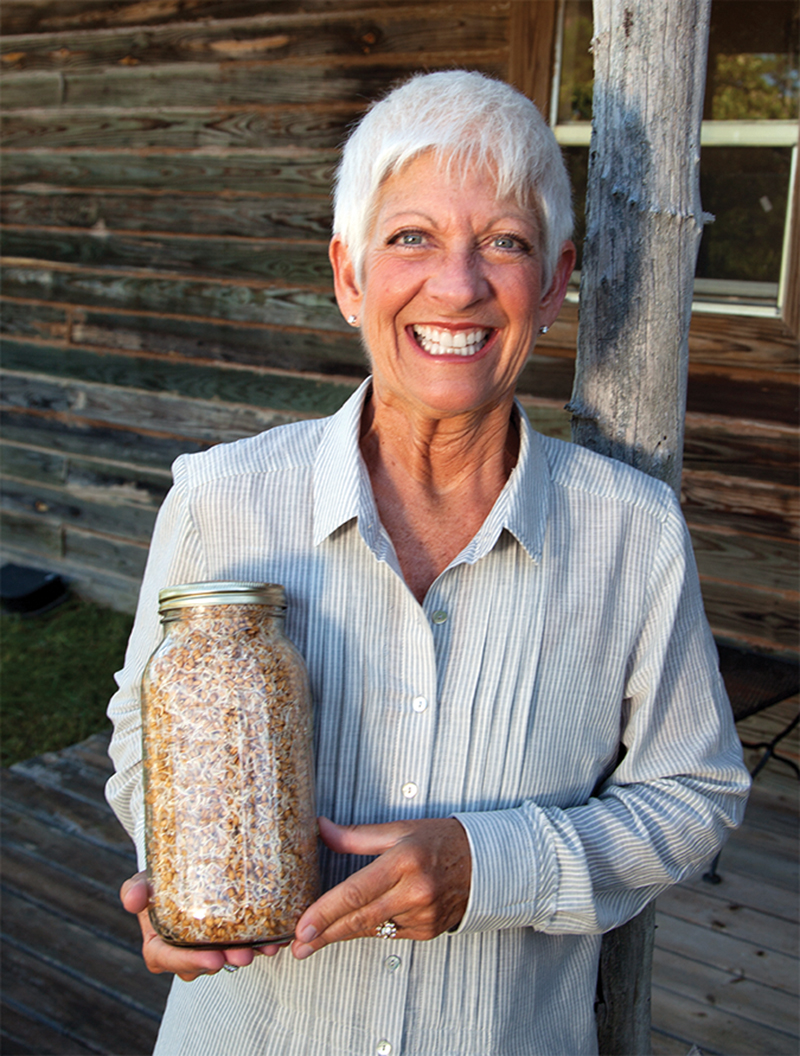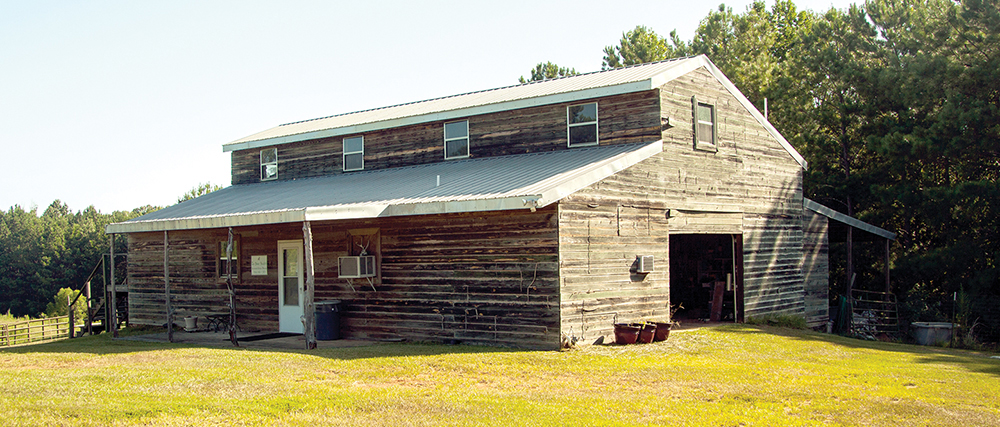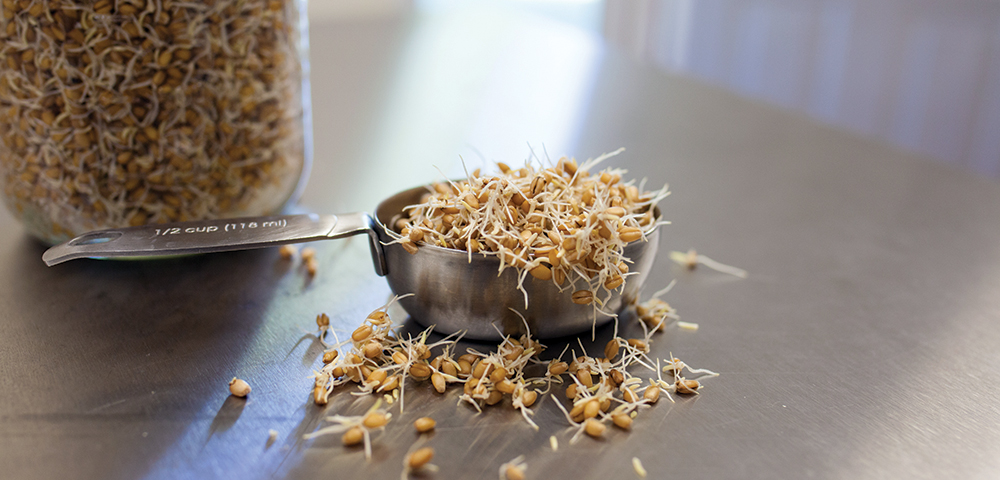Story by Allison Griffin, Photos by Michael Cornelison
To Your Health Sprouted Flour remains committed to rural Alabama
The trucks rolling out of To Your Health Sprouted Flour’s production site, located in rural Bullock County, could be carrying the company’s sprouted grains and flours to a nearby retailer – perhaps a farmer’s market just off U.S. 231, or a grocer up the road in east Montgomery.
Or the trailers full of organic products could be headed for more exotic locales: The company exports bulk orders to Canada, Mexico, Australia and England. It just recently picked up New Zealand. On one recent July day, workers were preparing a shipment for Denmark. They just shipped an order to Mongolia.
All this from the company’s home near Fitzpatrick, population 80. Owner and founder Peggy Sutton was born and raised in Bullock County, and her heart is there.
And there it will remain: Her company just opened its third building, which will allow its production to increase from 50,000 pounds of sprouted flours per week to 120,000 pounds per week. It will have the capacity to grow into about 250,000 pounds a week.
And it all grew from Sutton’s home kitchen, with some Mason jars and an idea to find a healthy way to return to a simple, traditional preparation of food.
A healthy alternative

Around 2004, Sutton started researching more healthful methods of cooking and baking, and uncovered the time-honored tradition of sprouting grains to maximize nutritional benefits and improve digestion of food.
Sprouted grains are made from whole grains and seeds, which have a natural barrier to protect the nutrients. The sprouting process turns a dormant seed into a living plant.
“All those nutrients that were dormant inside the seed, when we break the barrier down in the soaking process, it breaks that down and allows all those nutrients to start multiplying,” Sutton says.
The nutrition is much higher in the sprouted versions of everything, she says, noting that some studies have found that the levels of vitamin C can go up as much as 700 percent, and beta carotene and B vitamins are actually produced in the sprouting process.
Another benefit to sprouting, she says, is that a portion of the starch is broken down into simple sugars, so it burns easier as energy.
Intrigued with her research, Sutton took some Mason jars, sprouted some grains, dried them, milled them into flour and made bread. She was blown away by the taste; she says sprouting brings out a grain’s natural flavors and takes away its bitterness. Compared to regular bread in stores, even bakery-fresh bread, she says the sprouted flour bread’s taste “is just phenomenal.”
An idea is sprouted
 Sutton started sharing her goods baked with sprouted flours with friends and family, who clamored for more. She put out samples at farmers markets, and thanks to her marketing background, a down-home demeanor and some delicious products, people took notice.
Sutton started sharing her goods baked with sprouted flours with friends and family, who clamored for more. She put out samples at farmers markets, and thanks to her marketing background, a down-home demeanor and some delicious products, people took notice.
Business for the baked goods was brisk, but soon home bakers and small bakeries wanted to buy her sprouted flours. By 2009, she transitioned out of baked goods and into the flours, which was less labor-intensive.
Then the big guys came calling. Whole Foods wanted to buy her sprouted flour by the pallet, which is 2,000 pounds. “That’s when I said to (her husband) Jeff, ‘Honey, you know my little hobby could become a business, if you’ll help me with it.’”
Jeff supported his wife’s vision and came on board with the new company. The growth has been rapid ever since. She quickly outgrew her kitchen and took over Jeff’s new barn (he didn’t even get to use it for the first three years after he built it, Sutton says). After opening in 2010, the company opened a second building in 2013. Now the newest building, with an additional 30,000 square feet, has just opened; Jeff was in charge of the construction project and continues to be in charge of bulk sales.
Thinking back on the days of Mason jars and sprouting in the barn, she couldn’t have imagined her future success. She was simply thrilled to have found a vocation that paired her love of healthy food and passion for baking with providing a product that her customers have come to love.
Even now, she’s on the job, every day.
“I tell people, this is God’s plan,” she says. “We’re just trying to be good stewards of it. My vision, I just wanted everybody to have an opportunity to bake with sprouted flour, because I was just blown away when I discovered it. God has seen a way to make it happen.”
Making an investment
To Your Health, which is served by Dixie Electric Cooperative, is deeply invested in rural central Alabama. Thirty-two of the company’s 35 employees live in the county, which creates a large economic impact. Within the next two years, thanks to the new building, she hopes to create another 15 to 20 jobs.
 “The best place for my business would be in the grain belt, for transportation reasons and easy access to the grains,” Sutton says. “But growing this business, right here in Bullock County, Alabama, has not been a hindrance whatsoever. And we’re thankful for that.”
“The best place for my business would be in the grain belt, for transportation reasons and easy access to the grains,” Sutton says. “But growing this business, right here in Bullock County, Alabama, has not been a hindrance whatsoever. And we’re thankful for that.”
Sutton would like to see other agricultural opportunities sprout and flourish in rural Alabama. She thinks the state, and the market, is ripe for an organic farming cooperative, and that the younger generation, which seems to be taking an interest in where their food comes from, could sustain it.
She has a bit of a selfish motive; she would like purchase her grains from farms in the Southeast, and of course in Alabama. Most of her grains must come from the Midwest, the Northwest and Canada.
The cooperative model, upon which rural electric cooperatives are based, would work well, she thinks. She envisions a young farmer who has the drive and the skill to farm organically; a cooperative could help with irrigation, fencing, shared equipment, etc. To Your Health would buy everything he can pull off the field at market price. Sutton would save money on the shipping costs of the grains, but would also be able say that she “buys local.”
For now, Sutton continues to sprout in her kitchens and loves coming up with new products. Now, the company is manufacturing granola, which she used to make when she was still baking. And To Your Health is supplying the key ingredients in the new Kashi Organic Promise Sprouted Grains Cereal, and Sutton is even featured on the box.
Asked if she could have imagined her future success when she was sprouting in her home kitchen, Sutton laughs, “No! I was excited to put my samples out at farmer’s markets. I was like, ‘Y’all have to try this!’ I thought I was on top of the world.
“But with running a business, it’s not all fun and games. But it gives me a purpose, and what a nice one it is. We’re providing a good healthy product, and I’m able to employ good folks in Bullock County who need to work. It’s still a win-win situation.”





